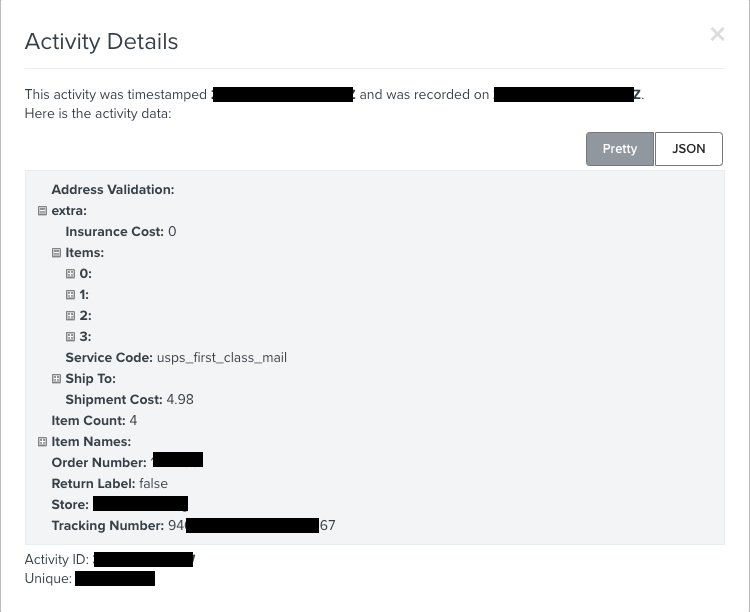I am trying to include the tracking information in my shipping confirmation emails. however i cannot find a dynamic tag anywhere. Can you please provide a dynamic tag for the tracking number after an order is completed in woo commerce.
Hello
Great question!
At present, the integration between WooCommerce and Klaviyo does not pass a tracking number as part of the events payloads synced from WooCommerce. For this reason, you would not be able to find a dynamic tag when previewing your event metadata when building out your Shipping Confirmation email.
In order to push a tracking number for a user's order from WooCommerce to Klaviyo, you would have to use a 3rd party app such as AfterShip or ShipStation. Because these two apps have a direct integration with Klaviyo, you can find a guide on how to connect and use these two applications with Klaviyo from the How to Integrate with AfterShip and How to Integrate with ShipStation Help Center articles.
Once you have either one of integration up and running or a third party shipping integration you prefer, the way you would bring the tracking number into your Klaviyo emails is by creating a new flow triggered off of an event that contains the tracking number i.e. "Shipped Package", drag and drop an email into the flow and preview that email. That will present you with a modal where you can click and select a tag. Copying and pasting the tag for shipping number anywhere in your email will dynamically display the shipping number for each recipient. We also offer a full guide on using dynamic data in our About Using Event Variables to Personalize Flows Help Center article which may prove helpful in further understanding how to leverage dynamic event data in an email.
Alternatively, instead of using a third party shipping application integrated with Klaviyo, you can custom code your own metric/event to replace the WooCommerce Fulfilled Order event. Because this would be a custom event, you can program it to pass your desired information; including a tracking number if it was recorded within your WooCommerce backend. If you do decide to go this route, I would strongly suggest working with a developer you are familiar with or finding and working with one through our Klaviyo Partner Directory. I’ve also included some Help Center articles and documents that may be helpful in building your own custom event below:
- Getting Started with Klaviyo APIs
- Track and Identify API Reference
- Guide to Integrating a Standard Ecommerce Platform
- Klaviyo API Documentation
I hope this helps!
David
I can only imagine the tens of thousands of hours WooCommerce shop owners like me have wasted trying to find a solution to the issue of Klaviyo NOT taking down order tracking information from WooCommerce.
All the bullshit that I read before becoming a Klaviyo paid customer led me to believe that the Klaviyo/WooCommerce API would magically download all the information that I was ever likely to need for incorporating into my email templates. How wrong I was!
The single most important email that a customer wants to receive is the email containing the Tracking number and link url. Yet, not only is this not available in Klaviyo (but is in WooCommerce!) but Klaviyo hasn’t the decency nor transparency to make this fact easy to find on the website.
Maybe, I’ve got this all wrong and I am the ONLY ecommerce merchant in the world that needs to send shipping tracking data to customers using while WooCommerce and Klaviyo. Somehow, I doubt it….
So here are a few questions that I would appriciate answers to;
- Would it be so hard for Klaviyo to provide this ‘out of the box’?
- Is there a commercial or technical reason that the tracking number is not available in Klaviyo?
- Is there a justifiable reason why it took me nearly two weeks of searching the Klaviyo website, community and tech support to find out what MUST be common knowledge?
- Why does Klaviyo recommend using paid for (monthly!) platforms AfterShip or ShopWired to enable the passing of this data to Klaviyo, when the information is already in WooCommerce?
Hey
Let me first extend and apologize for your frustration with Klaviyo not being shared shipping and tracking information from WooCommerce by default.
Shipping and tracking information are not synced to Klaviyo as an out of the box solution from WooCommerce because even for WooCommerce, shipping and tracking information are not an out of the box solution for them. Instead, an additional Shipment Tracking plugin is required in order for WooCommerce to ingest this data. Not only that, but this is only one of many available shipment tracking plugins available from the WordPress/WooCommerce Directory.
Like many integrations Klaviyo has, it works by connecting to a software’s API endpoint and sync over as much data as possible so long as they are readily available. In other terms, when two tools (Klaviyo and WooCommerce) are connected, those endpoints are linked in a 1:1 format and whatever data is available as part of those endpoints are predefined and shared to Klaviyo.
Unlike with a Shopify or BigCommerce integration, which are defined to pass shipping and shipment tracking information natively - albeit blank if its unavailable or not in use - as part of their Fulfilled Order payload, the same cannot be said for WooCommerce. Natively, WooCommerce’s Fulfilled Order does not include shipment tracking information at all. You can even review this through WooCommerce’s own REST API documentation. This limitation has also been brought up in WooCommerce’s own Community Support blog: How use WooCommerce API to update order with tracking number.
Since shipment tracking isn’t a native data points of WooCommerce’s endpoints, it would be fairly difficult for Klaviyo to sync this additional data point over as even for WooCommerce it would be considered third-party data. Although WooCommerce accepts this data using plugins, its order API endpoints are not aligned to share many of these shipping details. For this reason, we suggest connecting these third-party tools to Klaviyo in order to sync this data over and utilize it.
We typically suggest using AfterShip or ShipStation to bring these data points over as we have a direct integration with these two softwares/tools but you would not be limited to just those two. In fact, a number of other third-party tools and developers have created their own connection to Klaviyo which you can find in our Integration Directory including Wonderment, Narvar, and ShipBob to name a few. Even if your preferred shipping tool does not have an available integration with Klaviyo I’ve seen other members leverage tools like Zapier to connect their third-party tools to Klaviyo in a seamless manner to accomplish their goal.
I hope this adds insight into all the intricacies of the integration and how we always try to find a path forward. As always, thanks for being a part of the Klaviyo Community!
David
I am trying to include the tracking information in my shipping confirmation emails. however i cannot find a dynamic tag anywhere. Can you please provide a dynamic tag for the tracking number after an order is completed in woo commerce.
Hey
We typically suggest using AfterShip or ShipStation to bring these data points over as we have a direct integration with these two softwares/tools but you would not be limited to just those two. In fact, a number of other third-party tools and developers have created their own connection to Klaviyo which you can find in our Integration Directory including Wonderment, Narvar, and ShipBob to name a few. Even if your preferred shipping tool does not have an available integration with Klaviyo I’ve seen other members leverage tools like Zapier to connect their third-party tools to Klaviyo in a seamless manner to accomplish their goal.
David
Hi David,
I have tried tham ALL and none of them can pass the tracking data to Klavio. Here, for exaple is the reply from ShipStation
“Hi Eamonn,
I have looked into this further, and can confirm that, although the order can be imported as Shipped, the feed from WooCommerce does not include the tracking number, so we are unable to pass it on to any other parties.
I am including the feed for reference. I have checked the backend, but there is no existing way of passing tracking numbers to 3rd parties, unless the label is created through ShipStation.”
What i would greatly appriciate is if someone in klaviyo would reach out to an existing customer and establish EXACTLY how they are getting their tracking information from WooCommerce. Is this really too much to ask???
Incidentally, I have the WooCommerce Tracking plugin installed on my website and the the dynamic tracking codes are on the WC dashboard but cannot be retrieved in Klaviyo.
Seriously, sending an email containing a tracking number and URL should be ecommerce 101 especially for a company the size of Klaviyo. If your competitors can do it why not you?
Eamonn
Hey
Thanks for sharing that email correspondence you’ve had with ShipStation as it further supports the points I mentioned prior.
I believe the confusion here is that after leveraging these third-party tools, you’re under the impression that they would actually match the shipping/tracking number to WooCommerce’s Order API to make it an available data point when creating a transactional email triggered by a WooCommerce metric in Klaviyo. As mentioned above, this wouldn’t be a viable route. Instead, you’ll actually want the Klaviyo transactional flow to be triggered by a metric passed from the third-party tool you’re using that’s been integrated with Klaviyo - which is why we recommend tools that already have a native connection with Klaviyo such as ShipStation or AfterShip.
In this case, if you’re using ShipStation and you’ve connected it with Klaviyo, you should have the ability to create a transactional flow using ShipStation’s Order Shipped event. This event will include a tracking number as part of it’s event metadata as highlighted from an (abridged) example payload below:

In my experience, I’ve also seen a number of other businesses opt to trigger their transactional emails using these third-party events or custom events over the standard ecommerce ones as it allows for more informative details to be relayed to their customers. An example of this - using AfterShip - would be creating an Order Delivered flow by leveraging AfterShip’s Received Delivery to let the customer know their package has been successfully delivered or AfterShip’s Failed Delivery Attempt event to inform customers that their delivery was unsuccessful.
I hope this clarifies the confusion that instead of building a flow using your WooCommerce data, you’ll want to actually build your flows triggered by the ShipStation event if you wanted to highlight the tracking/shipping number in your emails.
David
Reply
Log in to the Community
Use your Klaviyo credentials
Log in with Klaviyo
Use your Klaviyo credentials
Log in with KlaviyoEnter your E-mail address. We'll send you an e-mail with instructions to reset your password.

